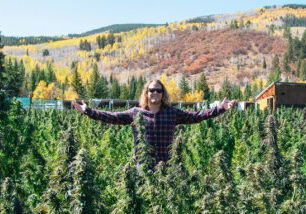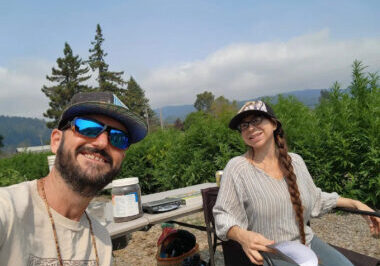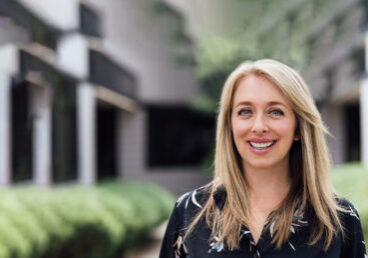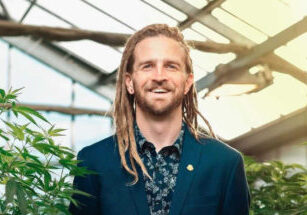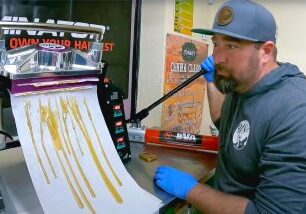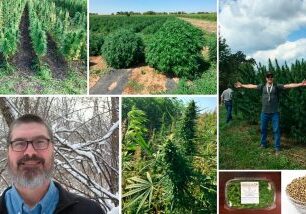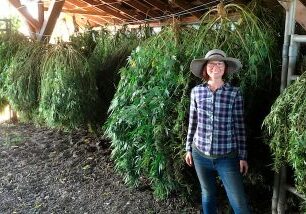In this episode, we’re chatting with Jason Wilson, host of the Curious About Cannabis podcast and author of the book, Curious About Cannabis. Jason is a biologist and science communicator who specializes in the science of cannabis with a focus on biochemistry, testing, and more. He’s currently the CEO of the social media company, Natural Learning Enterprises, and Principal Scientist for his own natural products research lab, Natural Learning Laboratories. He’s also studied permaculture design in ecologically conscious agricultural principles in Southern Oregon.
Our hosts for this episode are Reed Preston, founder of Preston Hemp Co, and Dana Mosman, co-founder of Triminator.
Transcript
Intro: Welcome to Own Your Harvest, powered by Triminator, a global leader in Cannabis Harvesting Equipment. We will be bringing new, valuable insights from the front lines of the cannabis industry, giving direct access to our award-winning team and educating you on a variety of topics. From field service to extraction, we have lined up some amazing guests for 2021 to kick off this new podcast, and nowhere are your hosts Reed Preston, founder of Preston Hemp Co, and Triminator ambassador and Co-founder of Triminator Dana Mosman.
Reed Preston: Welcome to the Own Your Harvest podcast. This is the sixth episode of our podcast series. I’m Reed Preston, founder of Preston Hemp Co, and an ambassador for Triminator. I’ll be hosting this series along with our Triminator co-founder Dana Mosman. This episode we’re going to be chatting with Jason Wilson, host of the Curious About Cannabis podcast and author of the Curious About Cannabis book. Jason is a biologist and science communicator who specializes in the science of cannabis with the focus on biochemistry, testing, and more. He’s currently the CEO of the social media company, Natural Learning Enterprises, and Principal Scientist for his own natural products research lab, Natural Learning Laboratories. He’s also studied permaculture design in ecologically conscious agricultural principles in Southern Oregon.
Dana Mosman: Awesome, thanks for the intro, Reed. Yeah, I’m happy to have Jason on here. This is our first episode collaborating with another podcaster in the cannabis space. And I’m really excited to dig in and learn from someone who has over 80 episodes, sounds like, of podcasting experience. So, that’s exciting. One of the things we do on this podcast is we like to try and educate people from all corners of the industry, and so that we can transfer that knowledge from one kind of region or corner to another. And I know a lot of Jason’s work with Natural Learning Enterprises, and his podcast is also focused on that. So, it’s great to have him on. In addition, Jason has a very unique story about his journey into the cannabis industry, coming from Mississippi and being the son of a Southern Baptist preacher, which he’s promised to share with us. So, I’m excited to hear his story.
Reed Preston: Yeah, I’m really excited to hear about that too. You know, I love how this industry is just filled with people from all walks of life. So, Jason’s done a lot in the industry in his time. He’s cultivated, extracted, built testing labs, done research, and much, much more. So, I can imagine it’s been quite the ride coming from the south.
Dana Mosman: Absolutely. I know, like for us, when I started Triminator, it was like I always used to say that we made specialty agricultural equipment, because even in California, it was like cannabis was a little bit less popular than it is today. So, I can only imagine the response in the south is, maybe still is and certainly was dramatically different. So, let’s jump into the episode and welcome our guest, Jason Wilson from Natural EDU, Natural Learning Enterprises. And thanks for joining me again on the podcast today, Jason.
Jason Wilson: Yeah, thanks so much for having me. I really appreciate the invite. And it’s always fun, like you said, to get two podcasts together.
Dana Mosman: Absolutely.
Reed Preston: Yeah, yeah, no, definitely. Like, this is the first one that we’re doing with someone else in the space. And like Dana said, You’ve got over 80 podcasts right now. So, thanks for joining us as we kind of kick ours off. If you don’t mind, just starting out kind of with your background history, story growing up in Mississippi, and how you got involved in cannabis? Like, what drove your passion for the cannabis industry and the plant?
Jason Wilson: Yeah. So, I’ve always been attracted to natural products and biology and science and that sort of thing. You know, as a little kid, I loved identifying plants and trying to figure out which ones were medicinal or which ones were edible, and that sort of thing. So, I have quite a deep passion for just medicinal plants in general, that goes way back. But my connection to cannabis, it’s kind of funny. So, you mentioned, I’m the son of a Southern Baptist preacher, which is an interesting experience growing up. One thing that I was always really interested in growing up, and this is kind of a roundabout way to get to cannabis. But I was really interested in cults and studying cults and these different groups with interesting belief systems. And that, in a funny way, led me to studying psychedelics because a lot of different cults and things use psychedelics as part of their techniques for indoctrination and stuff.
And that got me into wanting to understand how psychedelics worked and how drugs worked in general. It was just kind of — I mean, this was like when I was 11 years old just trying to read up on these things and try to understand them. And then my dad also suffered from pretty severe PTSD, and was always getting put on different types of antidepressant, antipsychotic drugs and stuff. And I wanted to understand how those drugs worked. And so at an early, early age, I was studying pharmacology and trying to understand how drugs affect people and why. And so of course, through that kind of series of events, eventually, I got to learning about cannabis. And didn’t really think too much about it other than it was just sort of in my files in my brain of an interesting plant that had all of these applications.
And then in high school, I ended up in a — kind of a debate team scenario, I ended up having to debate about cannabis legalization. And that’s when I kind of went off the deep end in researching the science of cannabis and the politics and all that sort of thing. I learned, to my surprise, that Mississippi was one of the first states to ever decriminalize cannabis back in the 70s. Of course, that doesn’t stop them from arresting people in their cars. But in your home in Mississippi, you can have up to an ounce. And that’s not so progressive anymore, but back in the 70s, that was a really big deal. And so I started to get really interested in cannabis learning about it then. At this point, I was probably like, 15 or so 16, maybe, and really, kind of understanding more of the social context of cannabis, and started to recognize a lot of the hypocrisy around the laws. Of course, I was in Mississippi, in a very conservative area with very conservative parents in an extremely conservative overall environment, growing up in churches and things.
And so I started to run into some problems there, my curiosity was leading me into wanting to learn more about this plant. And I discovered quickly that there’s a huge taboo around it, and that it was even dangerous to talk about. Where I grew up, I mean, if you got busted for anything, a pipe, or a gram of cannabis or whatever, the cops tag you and they basically hunt you down. From that point on anywhere you go, you’ll get pulled over, because it’s a small town, they recognize you. And it’s like having a scarlet letter or something on you. You just kind of become vilified. And I watched a lot of my friends pretty much have their lives ruined, because in Mississippi, it’s really common to have checkpoints. So, late at night, the police just set up these checkpoints, sobriety checks, and if they smell any cannabis they’ll pull you off to the side and search your car. And I had several friends that got busted just with pipes on them, not even any cannabis actually on them, but just the paraphernalia was enough to send them to jail.
And so that started to really make me want to get more involved in kind of the activism side. I later went to the University of Mississippi, where the federal cannabis Research and Development Lab is that’s run by the National Institute of Drug Abuse. And at that time, I was working on starting one of the first normal chapters there, and like really getting involved in activism. And I wasn’t really much of a serious user at that point. I just recognized that it was ridiculous that this plant was illegal and that my friends were getting in trouble with it and all this sort of stuff. I was really still much more interested in psychedelics and that sort of thing than cannabis.
But then through my teenage years, I suffered a series of injuries to my spinal cord. I was a skateboarder back in the day, adrenaline junkie. You know, I was one of these folks that was jumping off of rooftops into pools and that sort of thing. And that caught up with me. I eventually ended up smashing my spine on a couple of rails and really messed it up to the point that I have permanent — really, really severe pain from that. And when I was in college and started to actually use cannabis more, I started to realize that whenever I used cannabis regularly, my back wouldn’t seize up, the pain wouldn’t be so bad and I was able to function at a much higher level than if I didn’t. And during that same time I’m going through drug trials to try to figure out how to treat the situation with my back.
Was put on steroids and off-label use of antidepressants for chronic pain and just muscle relaxers and all sorts of different things to try to figure out how it can be treated. And of course, nothing
worked. Because when it comes to chronic pain, and especially something involving multiple injuries like that, there’s not a lot you can do other than lifestyle changes; try to stay mobile, started doing yoga a lot. But the other option is opioids. Do you just start taking opiates regularly? That’s really the only thing that will actually kill the pain in a serious way. So, I basically had this choice of I could try to keep going down this path that conventional medicine had laid out for me, which was routine steroid injections, and using muscle relaxers, and acute use of opiates, which had all sorts of problems tied to it, not just the addictive component of opiates, but also side effects from all of these things. Or I could use cannabis and everything was pretty much fine.
And so that’s when I started to really take the medical side much more seriously, because it really came home for me. And that’s when I started to think, okay, I need to relocate myself somewhere where I can become a patient, get access to cannabis regularly and not worry about going to prison every day. And one thing led to another. I ended up going to grad school in Oregon, and stayed there for almost a decade. And so became a patient and really dove into cannabis and dedicated my professional career to try to understand how it works, why it works, and then trying to communicate that to other people. And that’s kind of what eventually led to Curious About Cannabis.
And once I got through school and became a formal scientist and was working in labs where I could actually study the plant in a serious way. That’s when I started developing courses and writing the book. And yeah, that’s how we got to today basically, there’s a lot of in between, but that’s that’s everything in a nutshell.
Reed Preston: Awesome. Yeah, it’s an incredible story. And I’m excited to hear more about it. As we continue on. I heard you mentioned Southern Oregon, where you’re going to SOU?
Jason Wilson: Yeah, yeah. I did my graduate work at SOU, studying science education. So, when I — Right before I decided to go to grad school, because my academic world was kind of weird, because I originally wanted to go to medical school, and was going back and forth on what I wanted to study. And so I was studying psychology, because I kind of wanted to go into psychiatry so that I could study psychopharmacology and that sort of thing. And then I was also studying philosophy. And ended up getting through that and decided I don’t actually want to go to medical school. I’m kind of not too stoked about everyone that I had talked to that had made it through medical school and made it to psychiatry and all the stuff, the way they describe the journey and kind of their day to day, it was not exactly what I was looking for.
So, I ended up staying at the University of Mississippi for two years, just taking upper level biology and chemistry classes just to try to figure out what I was going to do next. And then in doing that, I ended up doing a lot of volunteer work with all sorts of different groups, the Natural Science Museum that’s in Jackson, Mississippi, various different science organizations and realized I had a really serious passion for teaching. And so SOU has this really unique program, where you can get a master’s in science education, and it’s essentially half of the coursework is all masters graduate level biology and chemistry, and then the rest is education. And so I am a formally trained educator, but then most of my professional work has all been applied science. I was a botanist for a little while and then got into the biochemistry side of things.
Dana Mosman: Very cool. You got a lot — Just that brief backstory there opened up a lot of questions for me, like all different avenues. But since we’re talking Oregon, the sort of recent legalization of the psychedelics and how do you view like you said early on, kind of in your journey, you were kind of talking or you’re interested in psychedelics And then move more to cannabis. And then it seems like cannabis a lot of people that are — we’re at the sort of forefront of the cannabis movement are now sort of moved more towards that psychedelic aspect of things. Like, what’s your view on how that is going to play out and how if at all it couples with cannabis, or just what’s your take on it?
Jason Wilson: Yeah. Well, I think a lot that we’ve learned from cannabis, both in the science aspect, but also the industry aspect, I think a lot of it is applicable and transferable. Like, one aspect is just studying the synergistic effects of all of the different chemicals that are in cannabis and how they work together to produce unique effects. The same sort of thing happens with psilocybin mushrooms, Ayahuasca, all of these different things. Obviously, when you start talking about isolated psychedelics, that’s a different story. But if you just focus on psilocybin mushrooms, for instance, which Oregon just legalized the medical use of that, there are entourage effects just like you would see in cannabis, and they’re not well understood.
And so a lot of the way we think about cannabis, and the types of questions we ask about cannabis are directly transferable to psychedelic natural products and that sort of thing. Obviously, the industry is going to look totally different in some regards, but I’m very excited about it. I honestly never thought that I would see psychedelics become so mainstream so fast in my lifetime. I knew cannabis, I knew that would happen. It seemed like the course was kind of laid out there. But I didn’t expect so many places to start decriminalizing entheogens and creating these avenues. So, for me, as a researcher where my focus is going these days, I’ll always be studying cannabis and working with cannabis in some way. But now, there are all of these very interesting avenues to use my lab and start to study psychedelics, and also, natural products broadly that may contain cannabinoid-like and psychedelic-like compounds that we haven’t even really explored yet.
So, just from that perspective, as a researcher, it’s a huge frontier that’s really, really exciting. There’s so much to learn and I think that in terms of mental health, and physical health too, chronic pain and things, psychedelics could be one of the most powerful tools that we have available for treatment. I did an interview with Rick Doblin from MAPS for one of my podcasts a while back, and he was discussing some of the outcomes they saw just in their MDMA trials with PTSD and just how, I think he said 60% of people that went through one of the recent trials, basically didn’t even qualify for having PTSD anymore. And that was at a, I think, a six month follow up. So, the power that these natural products and even synthetically derived psychedelics could have for treating things like mental health, which is an issue I struggle with, as well is profound on a level that I don’t think most people are anticipating.
Reed Preston: Like, micro-dosing mushrooms it’s become, like you said, like, how fast it just kind of hit just psychedelics and specifically psilocybin, like just seeing celebrities coming out and saying, hey we’re micro-dosing mushrooms, and it’s really helping us. We really believe in it. And seeing it all over, it’s incredible. I think, like you mentioned, kind of take what we’ve learned from cannabis and being able to apply it to psilocybin, or whatever it may be, it’s like, we’ve kind of laid out this platform for it right now, right, with all the trial and error that’s been going on with cannabis for so long and still haven’t figured it out yet. Right? But kind of got it laid out. And you know, it’s funny, on that topic, like seeing just states, legal like going — legal like Oklahoma just opened up the floodgates and it’s like are we going to learn? How are we going to get just something broad that can be applicable to each state that legalizes or is it going to go federal? You know, what’s going on here?
Jason Wilson: Yeah, I mean, I think it’s going to be a patchwork, a checkerboard of strange legal environments for quite a while. Even after federal decriminalization, if, when that ever happens, it’s like politicians keep promising, keep promising it. And like, at this point, I’ve seen so many bills put forward over even just the last six years or so that I’ll believe it when I see it. But even when that happens, it’s still going to be a state-by-state thing, you know, potentially forever. I mean, alcohol’s kind of the same way. Like I think about Mississippi, Mississippi, every county decides whether they allow alcohol sales or not. We had dry counties all the way up until just a couple years ago or something, I think. There may still be one or two. So, yeah, each state is going to be looking at the other states, and try to copy what they think works for their culture and their citizenry. And it’s going to be weird for a while.
Dana Mosman: Yeah. Is it changing in the south, like, relative to the outlook on cannabis, or like the perception of cannabis?
Jason Wilson: It is, yeah. I’ve been really surprised. So, I haven’t been back in Mississippi very long. You know, I lived in Oregon for almost 10 years, and then just this January, came back to Mississippi to try to see what opportunities may be here, because Mississippi just legalized medical marijuana, kind of twice because they did it by ballot initiative. And then the ballot initiative process was deemed unconstitutional, which is pretty fucked up. But that happened. And then another bill was put together and they passed that. So, that was an exciting moment for me to say, okay, now I might be able to actually return home, and try to bring back all of this work that I’ve done in Oregon, and try to share it and hopefully help people get really positive outcomes, tried to train clinicians and that sort of thing.
And I’ve been really, really surprised at how much has changed in the 10 years I’ve been gone and mostly because of hemp. Hemp is really, for states in the South, it’s really opened things up quite a bit. Here where I am in northern Mississippi right now, there are “CBD stores” in almost every other shopping center, and they all sell Delta-8 and Delta-10 THC products. And people everywhere if I mentioned Delta-8, they’re all like, yeah, of course, like, we’re all using Delta-8 and Delta-10 and all this stuff. And I’m like, just openly, like, you just talked about it? And all of that is a very open thing. And even the police, they have strange explanations of why they can’t do anything about any of that, which is — [crosstalk]
Dana Mosman: Is there, like, do people like consciously link the effects that they’re similar? Like Delta-8 like cannabis Delta-8 effects, right? Like, it’s not — [crosstalk] really hemp.
Jason Wilson: Yeah, it’s very strange. You know, one thing I’ve learned is a lot of folks out here don’t understand that Delta-8 and Delta-10 and a lot of these other THC isomers are being synthetically derived from CBD. And when I tell them that they’re like, “Oh, I didn’t realize that.” And some of the marketing makes it seem like people are out there growing plants with high concentrations of Delta-8 THC on them. And when I say, no, no, no, it’s hemp that people are spraying with Delta-8 THC, it kind of makes them think and then I say the only reason that this is the case, is because cannabis is prohibited. You wouldn’t have a need for these types of products if you just had access to cannabis in Delta-9. And if you did have a need for it, well, when you synthetically derived Delta-8 from Delta-9, you don’t get all of these weird chemical byproducts that you get when you try to take CBD to Delta-8 THC.
And so even if you did want Delta-8 THC, it’s still better to have it under a legal cannabis market where processors can actually take Delta-9 and just convert it over. And it’s a much more straightforward, cleaner reaction than trying to do it from CBD. And so there’s a lot of education there. But in general, the kind of knee jerk flinching taboo around marijuana is largely gone out of the southern states from what I’ve seen, and just seeing the way people have responded to the medical program out here, I mean, I think around 74% of voters voted for the medical program. And so that shows you it’s not a partisan issue the vast majority of people support access to cannabis.
Now, the arguments I’m running into now, which I find very interesting is folks that say, well, I support medical use, but I still don’t know about recreational use and that’s an interesting conversation because I don’t even like the term recreational use. I’m like, well, you mean like an adult use program. I use myself as an example and I say when Oregon legalized I was a card holding patient, but then I had no need to get a card anymore. Because I could just go to any store, if I didn’t want to pay taxes, then I could go get a card. But I mean, it’s like 300 bucks total to go through the hoops to do that. So, why would I? But I’m still a patient. I’m still using it for the same reasons.
And so this — I think sometimes this is a deliberate thing by politicians to make people think in these strange dichotomies of like, well, there’s medical and there’s recreational. And really for me, I’m like, well, no, it’s a — This is a product that is incredibly safe, of which we allow adults to have access to things that are infinite orders of magnitude more dangerous. And so it’s really just an access issue and who’s allowed access. And do you think adults should be able to use their brains to decide whether they want to interact with this plant or not and leave it at that. I don’t really think it’s a recreational versus medical issue. But a lot of that language is still floating around.
So, I’m hoping I can help kind of steer that conversation away from that perspective, and more towards just thinking about, like, why should people be restricted from it in the first place if they’re discerning adults. For children, pediatric use, there should still be some additional gatekeeping there to keep them safe. I know there are legitimate reasons why you want to try to protect kids from high doses of THC and stuff. It can cause some issues, depending on how young they are. But for adults we’re talking about one of the safest natural products known to man. So, yeah, that’s been my perspective.
Dana Mosman: Yeah. You had, I mean, you had a fair amount of experience with the testing labs, and that sort of that whole space. Was that in Oregon, or where did you do that? So, I imagine you were on the sort of like the forefront of the Oregon wave there.
Jason Wilson: Yes, I was. So, that was a really fascinating experience. So, I came to Oregon in 2013. And pretty much immediately got involved. So, when I — trying to think of the timeline, when I was in grad school, I ended up reaching out to a lab that was in Medford, or is actually in Central Point, right outside of Medford. And they were just getting started. And I just sent an email and it’s like I’m about to graduate grad school. I’ve been a botanist with the federal government, want to keep working with plants, want to study plants, interested in studying cannabis. I’ve got a little bit of experience seeing how a lab would function in this context, because of the University of Mississippi. Something I forgot to mention, is I actually got to spend a little bit of time at the Cannabis lab at the University of Mississippi. At the time, I was working in the IT department, and I was helping fix some of their instruments and things in that lab. But that was a really early exposure for me, like, oh, wouldn’t it be cool to work in a situation like this.
And then years later, I ended up with this opportunity. I was the first employee for this lab called Kenevir Research and it quickly turned into — I got along really, really well with my boss who had turned into my mentor, Dr. Anthony Smith. And he was a scientist that had come out of Oregon State, had studied at the Linus Pauling Institute, all about — just passionate about medicinal plants, natural products. So, him and I vibed really, really well. And so we just kind of partnered up and we’re like, Let’s build this out and do it right, and focus on quality, and focus on not just compliance testing, but also research, really trying to make sure that we’re carving out time to understand a lot of these products. And so yeah, we built that lab up. And we were the first lab built that was located in Southern Oregon that was focused on cannabis. And then we were one of the first — There were three labs that all got accredited at the same time on the same week in Oregon, and we were one of those. It was us, Greenleaf labs and Pyxis. And so we were one of the first accredited labs in the state. And we also coordinated with other accredited labs even before accreditation was required for the state.
So, like pesticides, we collaborated with pesticide testing lab, that was their main focus, and so generated a lot of interesting data in the early early days before even testing was required. So, yeah, we saw a lot of interesting things evolve. You know, pesticides were a huge issue early on. Nowadays, it’s not so much of an issue. And just seeing that change was really fascinating. And other things, too, I remember when the Clear came on the market. And everybody wondered what’s the deal with this Clear extract? And it’s the most potent thing in the world. And we’re like, I mean, it’s like 55-60%. But it’s interesting, they’ve cleared it up. It’s a distillate. And at the time, I remember folks were just kind of like, “What is a distillate?” And so we really saw this evolution of products and stuff from the very beginning. Because like I said, when we got started, dispensaries weren’t a thing in Oregon yet and testing wasn’t required. And we rode that whole wave all the way through legalization, and then I ended up getting burnout around 2017 once the [crosstalk]
Dana Mosman: What was the impetus to start it before it was a requirement? I mean, like as a farmer, what would you gain from the testing that you were providing?
Jason Wilson: Most of our clients in the early days were patients. And so there were patients that were growing their own, that were making their own products, and just wanted to get their dosing right, and wanted to know that they were clean. And man, that was a really sweet period of time. And it’s something, it’s one reason why I’m pivoting back to product R&D, because it was so fulfilling to work with patients and to see the direct impact that you were having in guiding these people. And so they’d bring in edibles that they made or tinctures that they’d made and just helping them understand what they have, and how they can use it in a productive way, consistently and safely, and then seeing the outcomes.
I remember, there were times I would come home in the first couple of years that we were running the lab, I would come home to my wife and I would just like cry for a while just because you hear these stories and you see these people, people that are suffering through just really really terrible, debilitating conditions, and are actually finding relief. And at times were even having kind of breakthroughs because they would finally understand the dosing, finally understand the ratios of CBD to THC that they were trying to balance, and then they come back and tell us how it affected their lives. And sadly, once legalization happened and everything got much more — it just got bigger. And the testing requirements, the whole testing world just became about high throughput, compliance testing all the time.
And so the time for R&D dwindled, and dwindled and dwindled. And that was kind of what led to my burnout because all of the things I loved from studying this plant and working with other people with it, and everything just kind of got expunged to the point that you just kind of become a cog in the machine. You know, we’re just like, we’ve got 50 samples to run today, we got to get them out, go, go, go. Clients are expecting these insane turnaround times that you would never see in typical natural products testing. We even had a guy one time that came in, a gun strapped to his waist, his pitbull with him and he says, “Here’s my sample. I need test results in five minutes.” And we’re like, I don’t want to make you mad, but that’s impossible. And you know, he makes it very, very clear. Like, “No, I want my test results in five minutes.”
And so just that kind of stuff started happening that was, I don’t know, just kind of the antithesis of everything that I really loved about the science of cannabis and working with it. And so it was, yeah, it was a strange transition, seeing all of that. And I think it’s something that a lot of people today have trouble appreciating because a lot of folks today, getting into the industry will never see what came before. And that’s kind of sad.
Reed Preston: Yeah, I know, while we’re still on the topic of testing of it, I know you’re talking about Delta-8 and Delta-10 and stuff, like how involved are you still with testing? Are you doing consulting for labs at all? Or what’s kind of like your area with that?
Jason Wilson: Yeah. So, I still do consulting with labs and both commercial labs as well as — One thing I’ve really been doing a lot more of lately is helping producers build their own labs in house and helping them understand how to determine the accuracy of their data, how to hire the right people to ensure that their labs going to follow improperly, so that it adds value to their own operations as they’re developing products. I also have been working with universities. So, now that hemp is legal, a lot of universities have this opening, to start to do research and start to offer opportunities to students to really get their hands dirty with cannabis. And so that’s been really fun. I’ve been — I worked with the University of Georgia a little bit, helping them get just methods set up and kind of coaching them through what to expect in terms of all the different products that they’ll see. And then I have my own lab that I’m in the process of moving out here, that’s the whole ordeal. But — [crosstalk]
Dana Mosman: [inaudible 00:35:45] from Southern Oregon?
Jason Wilson: Yeah, yeah. So, I’ve got a couple of GCs and HPLC, and some other stuff in my own lab. And so what I’ll probably be doing out here in the southeast, wherever I end up, is kind of similar stuff, R&D testing, kind of taking products off the shelf, and just kind of seeing what’s there and doing some market research. And then, I think I mentioned early on, my focus lately is getting more and more into looking at other plants, as well as fungi as well. And looking for cannabinoid-like compounds that we haven’t studied yet, and trying to find new, basically, new uses for different types of natural products across the board. So, it’s expanding much farther beyond cannabis, but I’ll still probably forever be studying cannabis in the lab.
Reed Preston: Awesome. And then another question on that topic, I guess, since this is kind of your realm, what do you think about those, like at home testers right now, like those portable ones that people are getting? Like purple, if you’re the purple tester? What’s your take on those?
Jason Wilson: So, it depends on the technology, and it depends on what information you actually need. So, people ask me about that kind of stuff quite a bit. And the first thing that I’ll usually ask them is what data is most important to you? Do you actually need cannabinoid levels to be perfectly accurate? Or are you — Basically, are you looking for quantitative information or qualitative information? Do you just need to be able to track things to see if, for instance, with harvest, are you tracking plants to see when the THCA basically kind of plateaus so that you can time harvest? If that’s the case, then you don’t necessarily even need something to be quantitatively accurate, you just need it to be qualitatively accurate, meaning that’s consistent, and you’ll be able to see when things go up, and when they plateau, whether or not the numbers are actually accurate or not, may not even matter.
But then when you get into formulation, and product manufacturing, typically, quantitative accuracy matters quite a bit. And so usually what I tell people about a lot of the technologies around home testing, is, most of the technologies on the market today are way, way better than they were five years ago. I remember, a lot of these companies with these products would come to us at Kenevir Research and have us test drive them and compare it to the HPLC, compare it to the GC and all that sort of stuff. And the accuracy and precision was all over the place. There were these IR machines, I can’t remember the names of the actual products that they would use IR to shine a light on a bud that you sat on a glass plate, and it would measure cannabinoids that I remember early on, it was very inaccurate. And just all over the place if you measured the same sample and just kind of turned it a little bit, you get wildly different results.
These days, it seems like it’s getting more consistent and a lot of that is related to the manufacturers of these products, better training people on how to prepare samples so that they get consistent results. And then the technologies themselves have improved. So, in general, it’s a lot better than it was. But a lot of it still comes down to the person doing the tests how careful are they to ensure that they’re being careful in how they handle the sample, how they prepare the sample, that any measurements that they do you know, like for instance, there’s the orange photonics system, which is basically a prep liquid chromatography column connected to a spectrophotometer. And so it’s kind of like a miniature HPLC. And it’s very good. But you have to be good at the sample prep and consistent and very careful in your measurements and all of that sort of stuff, because you do have to still homogenized samples, put them under solvent do this basic extraction and filtration, before you’re sending it into the column to get the separation. And then you also have to be careful about calibrations and stuff.
So, the technology is good, but there’s still the human error component that you have to be careful about that I think folks underestimate, because it’s pitched to them that, look, you’ve got this equipment that you can benchtop, just get your samples tested in-house very, very quickly and easily. And so a lot of that consistency issues that we see just usually comes down to people needing a little bit of training, and a little bit of education to know what they’re doing to understand how the system they have works. Using something like an orange photonics system, which is far more sophisticated in the sense that it’s basically an HPLC, that’s very different than using something like IR, which is — there’s not really much you can do to troubleshoot issues with IR. You kind of get what you get.
And then there’s things like thin layer chromatography, which I actually teach workshops on this. Where thin layer chromatography is a technology that’s been used for ages for natural products research. And anyone can do it, you just have these little glass plates that are sprayed with a type of silicone there. And you’re just once again, grinding up a sample, putting it in solvent, filtering it and then putting that solvent on the plate. You then put the plate in a little, basically, what amounts to a mason jar with solvent in it. The solvent runs up the plate, you spray a dye on the plate, it produces all of these dots and bars and things that you can then measure to get an estimate on your cannabinoid potency for THC and CBD.
And those things can actually be pretty accurate depending on, once again, what information you need. They generally are only good for showing decarboxylated cannabinoids. But if that’s what you’re after, total THC total CBD can give you really, really good estimates for really cheap, like one of those kids is like 100 bucks. And you can be testing samples if your technique is good. And so that’s kind of a convoluted answer to your question. But in general, a lot of the technology is pretty good. But it just requires understanding and training on the part of the user to make sure that their data is accurate and precise.
Dana Mosman: For sure. Tell us, I mean, a little bit of a segue here. But I know you mentioned you’re doing some lab kind of consulting for in-house manufacturers, and then you’re also working in product development. So, tell us if you can, a little bit about how folks are using the labs in-house and maybe how that couples with product development?
Jason Wilson: Yeah. So, one of the main pain points that producers run into with testing is that if they’re trying to develop a new product, a new formula or some variation, and they’re having to tweak their process a lot and get different data points taken along the process, it gets really, really expensive to run that through a third party lab. Especially if you’re really wanting to do it right. For instance, one project I worked on, a producer was trying to make a new formula for a pretty basic product, a topical product. But they needed to understand how the cannabinoids were changing from harvest to, you know, they would do a drying technique before they did a CO2 extraction. And then from there, they had clean up on the CO2 extract.
And then from there, they were mixing the CO2 extract with other ingredients to get into this topical and they needed to understand their loss of cannabinoids at each step and how the chemicals are transforming so that they could manipulate that to protect those chemicals and try to minimize those transformations, try to find the best settings that could. For instance, get the product dry but not necessarily lose all the terpenes and everything, all sorts of different things like that. So, that requires a lot of testing along the process to really produce a nice data set where you can comfortably make a data driven decision about how you want to tweak things, so that you’re not wasting a lot of time and energy, just kind of haphazardly changing things.
And one project that we did for that led to over 100 samples that we had to test. And if you were to run that through a third party lab, that would cost usually somewhere between 50 to $100 a sample, just for potency. And then if you wanted terpenes, that’s another 50 to 100 bucks. And so you can kind of see how that adds up super quickly. Whereas if we do it in house, you can get the cost way, way down to a few bucks a sample, especially if the equipment’s paid off already. There’s obviously different variables that go into that. But in general, you can get those costs down to a few bucks a sample, and be able to get all of that data you want. And that data is very valuable. I mean, the companies that I help once they get through some of those studies, and doing all this testing themselves, they realize that those datasets are applicable in other ways they didn’t necessarily anticipate to begin with, to develop other products or tweak other processes.
So, that’s the big driver for that is just cost savings for product manufacturers, especially companies that want to do product manufacturing for other companies producers that are wanting to do white labeling, and all that sort of stuff, or co-packing. You know, they really, really want — they often really want a lot of data points and it’s just not very feasible to run that through a third party lab. Also, third party labs, like I said, they’re inundated with samples just to get things on the shelf for the market. So, trying to do R&D, you end up having pretty long turnaround times if, depending on what data you want, if you’re willing to get just a GC and an HPLC setup somewhere, you can have data within 10 minutes of a sample rather than having to wait days or even weeks sometimes. And so that’s a cost saving in and of itself, just reducing that time to where you can get that data and make a decision. So, I think those are the two driving forces there for producers.
Dana Mosman: Excellent. And what do you think about in terms of kind of product development? Where do you see the most interest or the most exciting opportunities for the future in the cannabis space?
Jason Wilson: For me, what I get really excited about is when a company comes to me that is interested in formulating products that leverage other medicinal plants and fungi with cannabis. I think cannabis is a very powerful medicinal plant by itself, but it becomes even more powerful and interesting to me when you start to combine it strategically with other medicinal plants to have various targeted effects. And so I think that, personally, I’m very interested to see the future of cannabis products evolve, to really leverage the vast amount of information that we have available to us about thousands of history — thousands of years of history of the use of medicinal plants. Looking at Ayurvedic medicine and traditional Chinese medicine, particularly in African medicine, and taking what’s been learned there, and figuring out where cannabis fits in the greater medicinal plant toolbox. That gets me really excited and I hope to see more creativity in the cannabis space as far as that goes, personally.
Dana Mosman: Absolutely. Yeah. No, that’s really interesting. We’re seeing some interesting mixes already, I think, and there’s just so much growth. So, hopefully we’ll see a whole different mix here in five years, right. It should be [crosstalk] really exciting.
Jason Wilson: Yeah. I have no doubts the industry and everything around cannabis will just continue to get ever more complex and interesting as we move forward. The floodgates have been open. So, even just on a research side, the number of research studies being published about cannabis every year is just exponentially increasing. And the same type of growth is going to happen just around the creative exploration of products and other things. It’s an exciting time, for sure.
Dana Mosman: Yeah, it sure is if we’re lucky. We’re lucky to be part of it. So, I know we have a hard stop coming up. So, thanks so much for coming on, Jason and good to spend some time and talk about a lot of interesting topics. If anyone wants to reach out to you about your podcast, your book or anything that you’re doing, what’s the best way for them to do that?
Jason Wilson: Yeah, the best way is, so everything about Curious about cannabis is that cacpodcast.com. There you can find links to the podcast, as well as information about the book. You can also find, we have all sorts of events that we do regularly, most of them virtual, although I’m hoping that will change soon now that COVID is maybe starting to get kind of under control. We’ll see. I try not to make any plans anymore because I’ve had so many plans ruined over the past couple of years trying to do events. But we do regular seminars and workshops and something that I encourage folks to look into if you really want to dive deep into the science of cannabis, check out our workshop series. It’s basically something I developed way back when that was meant to be a college class. And it’s a 15 week series that’s split into two classes, two seven and a half week classes. And it’s really, really intensive.
My students tell me it’s pretty challenging, but they also tell me it’s pretty rewarding. I really force people to dive into research literature and read the papers, discuss them, and explore their own interests along the way. So, check that out. And then of course, we’re always exploring all sorts of ways to engage people educationally. So, we have a Metaverse now too that people can check out at meta.cacpodcast.comthat’ll be rolling out completely pretty soon, but folks can go on there and kind of get a sneak peek of what’s there. We’ll be doing events and games and stuff through that so people can learn about cannabis. However they want to, we have all sorts of different ways. So, yeah, cacpodcast.com and then if anyone wants to learn about the broader work that I do through natural learning enterprises, that’s naturaledu.com.
Reed Preston: Sweet. I’ll make sure to get all those links down in the description on our podcast. Wow. Also going to see what’s up in the metaverse sometime here in the near future.
Jason Wilson: Definitely, look forward to seeing you on there. I forgot to mention too, our Discord is fairly active. And that’s kind of the bridge between the metaverse and everything else. So, you can hop on our Discord. There’s all sorts of different things going on there and a lot of folks from our educator team are on the discord. All sorts of doctors and pharmacists, clinicians, biochemists and stuff that work with cannabis. And so if you ever have questions about cannabis, it’s a nice place to go to that’s very supportive, and we try to get your questions answered as best we can.
Reed Preston: Awesome. I love it. Well, thank you so much, man again for taking the time out of your day and joining us here on this podcast. Again, anyone that enjoyed listening to this definitely check out Jason’s podcast, Curious About Cannabis. We’ve got some really exciting guests lined up. We’ve got Rick and Michael from Royal Gold Soil on our next podcast. So, yeah, thank you guys so much for listening to the Own Your Harvest podcast powered by Triminator. If you enjoyed this podcast, please subscribe to the show and share with your fellow growers and farmers, really appreciate the effort.
Jason Wilson: Thanks so much.
Reed Preston: Sweet.
